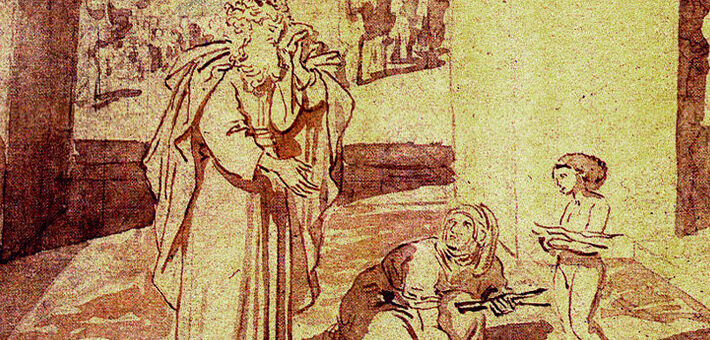Commentary on 1 Kings 17:8-16
On the surface, 1 Kings 17:8-16 tells a familiar story of a prophet who performs miracles.
A widow and her son, on the brink of starvation, are provided with an oil jug that will not run dry and a stash of grain that will never be empty. Such a surface reading misses the import of the specific details of this text, details that provide surprising hooks into the contemporary world.
This passage is part of the introduction of the prophet, Elijah, into the books of Kings. The first cycle of Elijah stories (1 Kings 17:1–19:18) centers on the nation’s economic collapse as the result of a severe drought that ruins crops and decimates the population. In the opening verse of the cycle, the reader is told that Israel’s God, Yahweh, has sent the drought.
Images of food and water permeate these chapters. The cycle is framed by two scenes where God feeds Elijah (17:4-7 and 19:5-9). The cycle depicts the interplay of religion and politics during national crisis. The drought is the result of the religious policies of Ahab, and it is prolonged by a lengthy government-sponsored contest between prophets of competing religions. This contest with the prophets of Baal in chapter 18 is won, not when Elijah calls fire down from heaven, but when clouds appear on the horizon (18:44-45).
The story of the widow of Zarephath precedes this contest. The story illustrates the severity of the drought, while the woman’s plight humanizes the casualties of this tragic interplay of politics and religion. The Elijah narrative then commences with a clear focus on those most vulnerable: a widow and her child.
In today’s world, the statistics on women and children in situations of famine are sobering. Human rights organizations note that the effects of natural disaster, including climate change, are felt most acutely by women and children. Oxfam International’s film, “Sisters on the Planet,” includes the story of a Ugandan woman named Martina during a time of severe drought (http://www.oxfam.org/en/campaigns/climatechange/sisters-planet).
Her story eerily echoes the passage from 1 Kings. Both stories open with the women gathering sticks to cook what meager food they can find. Both stories hint that the drought might be the result of a prophetic curse. In both narratives, the audience experiences the severity of the drought through the heartbreak of women unable to adequately feed their children.
Both stories require the audience to have compassion for the ways decisions in our homeland affect women in other parts of the world. One of the important details of the story in 1 Kings is that this woman is a Phoenician. Phoenicia was a rich country just north of Israel. Elijah is sent by God to this one woman. The effects of the drought are felt beyond the borders of Israel.
The story of the Phoenician widow sets up an ironic contrast with the other female figure who appears later in the cycle, Ahab’s queen, Jezebel, was also Phoenician and whose religious fervor for her native gods (Baal and Asherah) led to Ahab’s religious policies. The story of a poor widow from Phoenicia becomes a fitting contrast to the damaging effects of the workings of a rich Phoenician wife.
Although the story seems to be about Elijah, his actions are rather problematic on their own. His command to the woman to feed him the last of her grain is shocking. Why would she acquiesce? Did she feel threatened by him? She was, after all, alone and vulnerable. Or was she simply convinced that his prophetic promise of food (17:14) was authentic? The text does not say.
The true focus of this story should be on God. It is Yahweh who caused the drought, sent Elijah to Sidon, and provided food for the widow. Why does the story commence with God saving this poor Phoenician woman? There are probably many answers to that question, but let me offer three in particular.
- Saving a Phoenician woman demonstrates God’s care for the world. Although God will judge the Phoenician Jezebel, this is not a judgment on all Phoenicians.
- In this story about competing religious claims, Yahweh’s ability both to commence and to end drought undercuts the claim of both Israelites and foreigners that Baal is the only effective weather god, not only in Israel, but also across the globe.
- This is a story about the effects of economic injustice. The powerful, like Ahab and Jezebel are not starving, although they live in the same drought-stricken area. While they claim that the gods are on their side, the story reveals that God is on the side of those ignored by policy-makers.
While the pyrotechnics that appear later in the story have become the focus for Western appropriations of it, are they the point of the story? Is it not the main point that God is not aloof in these ideological battles? The author of 1 Kings is rather confident where God is located in the text, but the story reveals that the opponents were also sure that their gods cared about political power.
Today, attention to the economic elements of these stories carries a warning against such confidence. Although God may be on a side, when people start spending their resources to prove that they are right through religious pageantry and political persecution, then God is on the side of the innocent victims of such political maneuvering.
The proclamation of biblical texts in the context of a community of faith feeds the religious imagination of that community, and provides an opportunity to challenge naïve ethical conclusions that do not fully appreciate the impact of religious and political decisions on people at risk of starvation and death. They challenge the assumption that God is best seen in glorious victory and suggest that God is more present among those whose lives are most affected by the decisions of those in power.


June 9, 2013